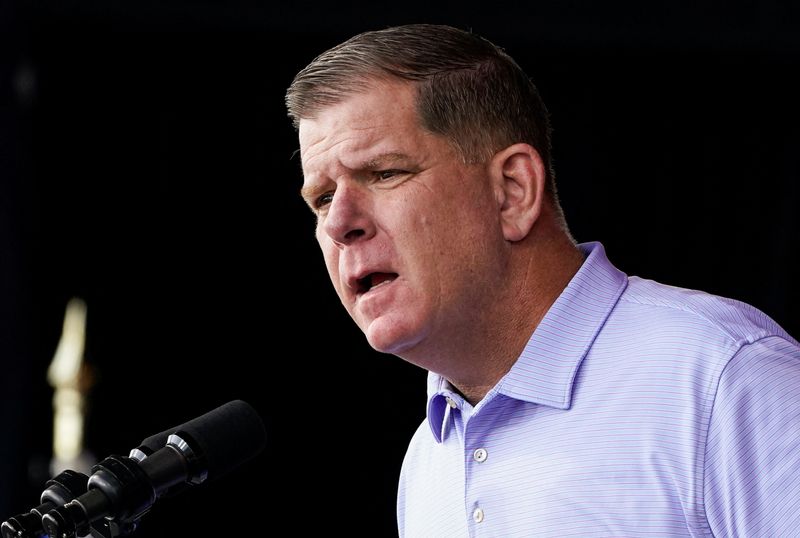U.S. labor chief hosts talks with union, railroads to avert shutdown
2022.09.14 11:55
[ad_1]

© Reuters. FILE PHOTO: U.S. Secretary of Labor Marty Walsh speaks on Labor Day at Henry Maier Festival Park in Milwaukee, Wisconsin, U.S., September 5, 2022. REUTERS/Elizabeth Frantz
By David Shepardson and Lisa Baertlein
DETROIT/LOS ANGELES (Reuters) -U.S. Labor Secretary Marty Walsh on Wednesday hosted talks in Washington with freight railroad and union officials aimed at heading off a rail shutdown looming as early as Friday that could disrupt cargo shipments and impede food and fuel supplies.
With a potential work stoppage affecting freight and passenger rail service, White House spokeswoman Karine Jean-Pierre told reporters aboard Air Force One that “all parties need to stay at the table, bargain in good faith to resolve outstanding issues and come to an agreement.”
“A shutdown of our freight rail system is (an) unacceptable outcome for our economy and the American people and all parties must work to avoid just that,” Jean-Pierre added.
The Labor Department in a statement called the meeting hosted by Walsh, which began around 9 a.m. EST (1300 GMT), the latest in efforts by President Joe Biden’s administration “to encourage the parties to come to a mutually beneficial agreement.”
The administration on Tuesday said it was making contingency plans aimed at ensuring deliveries of critical goods in the event of a shutdown while pressing railroads and unions to reach a deal.
A shutdown could freeze almost 30% of U.S. cargo shipments, stoke inflation, hinder supplies of food and fuel, cost the U.S. economy about $2 billion per day and cause transportation woes. The U.S. energy sector relies on railroads to move coal, , ethanol and other products.
Railroads including Union Pacific (NYSE:), Berkshire Hathaway (NYSE:)’s BNSF, CSX (NASDAQ:) and Norfolk Southern (NYSE:) have until a minute after midnight on Friday to reach tentative deals with three hold-out unions representing about 60,000 workers.
If agreements are not reached, there could be union strikes or employer lockouts. But the railroads and unions also could agree to stay at the bargaining table, or the Democratic-led U.S. Congress could intervene by extending talks or establishing settlement terms.
Separately, a union representing about 4,900 machinists, mechanics and maintenance personnel said on Wednesday its members voted to reject a tentative agreement with a committee that represents railroad operators.
Food, energy, automotive and retail groups have urged Congress to intervene, saying a rail shutdown could threaten everything from global grain supplies to shipments of goods related to Christmas holiday shopping.
A rail stoppage also could increase the time customers wait for vehicles.
Stellantis NV Chief Executive Carlos Tavares said the automaker is trying to be “flexible” in the way it transports vehicles and parts.
“The system is quite saturated right now,” Tavares told reporters during a videoconference on Wednesday. “If there is an additional roadblock that will just increase the lead time.”
The Corn Refiners Association and the National Corn Growers Association said in a joint statement that a work stoppage would “cripple U.S. agricultural production and supply chains and exacerbate food price inflation.”
Railroads originate 24% of U.S. grain shipments, of which approximately half is corn. Grain shipments scheduled for Thursday are being canceled.
U.S. passenger railroad Amtrak, which uses tracks maintained by freight railways, is facing growing disruptions. Amtrak said it will cancel trains on seven more long-distance routes on Wednesday after it began canceling trains on four long-distance routes on Tuesday.
Unions in the current talks have been offered significant pay increases. Three of 12 unions, representing about half of the 115,000 workers affected by the negotiations, have yet to sign deals. They are grappling with railroads over working conditions.
[ad_2]
Source link








